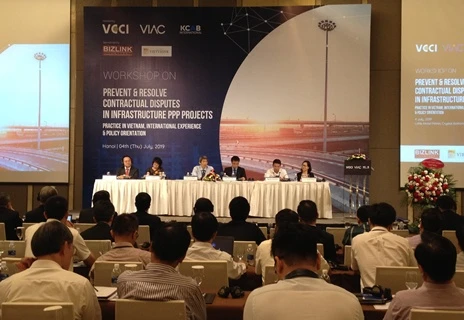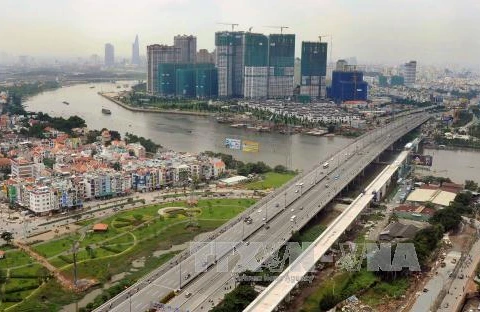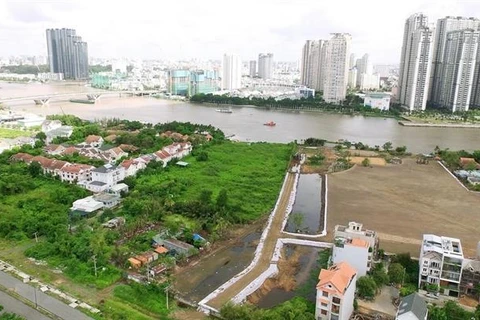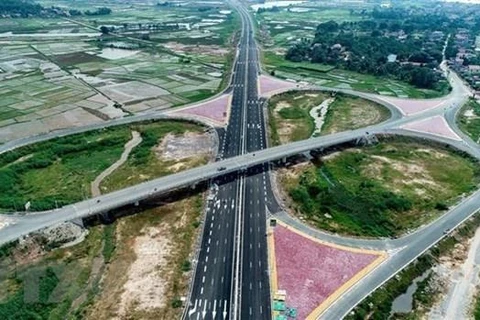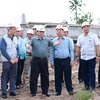 Minister of Planning and Investment Nguyen Chi Dung presents the report on the draft law on public-private partnership (PPP) at the National Assembly's Standing Committee meeting on September 16 (Photo: VNA)
Minister of Planning and Investment Nguyen Chi Dung presents the report on the draft law on public-private partnership (PPP) at the National Assembly's Standing Committee meeting on September 16 (Photo: VNA) Hanoi (VNA) - The National Assembly Standing Committee discussed a draft law on public-private partnership (PPP) projects, composed by the Ministry of Planning and Investment (MPI), during its 37th session in Hanoi on September 16.
The draft proposes PPP projects be unavailable in sectors that have so far seen no PPP projects, those with ineffective PPP projects, or those lacking appeal to investors, and others where other kinds of investment would be more fitting.
Under the draft, tourism; culture and sports; telecommunications infrastructure; infrastructure for science and technology development; infrastructure at industrial parks, economic zones, industrial clusters, and high-tech parks; and infrastructure for rural areas and agriculture would be banned from running PPP projects.
There are also changes in the draft law regarding Government guarantees and risk-sharing. Specifically, the draft proposes Government guarantees of foreign exchange balance for PPP projects be determined by the NA and the Prime Minister, with a maximum of 30 percent of project revenue paid to private investors in VND.
The risk-sharing mechanism for revenue is also proposed in the draft law to be extended to key projects decided by the NA and the PM.
Minister of Planning and Investment Nguyen Chi Dung said implementation of PPP projects in the past showed the investment in this model of PPP in Vietnam still had many risks.
Among them, there are market risks, but there are also many risks stemming from the Government's decisions, such as decisions to abandon fee collection tools or to waive road fee adjustment of planning and pricing mechanisms, or changes in foreign currency policy. Such risks would affect project revenue.
The Minister of Planning and Investment said a risk-sharing mechanism is necessary.
According to Dung, the draft law's revenue risk-sharing mechanism lets investors share a part of the risk when a project has a revenue deficit. On the other hand, the Government will receive back the shares when the project has revenue higher than the initial targets.
Specifically, the Government would have to commit to sharing with investors not more than half of the deficit between actual revenue and committed revenue in the contract, while investors have to share with the Government not less than half of the increase in revenue between actual revenue and committed revenue in the contract.
Head of the NA Judiciary Committee Le Thi Nga said the proposal was not rational.
When the Government signs a contract with investors, it should ensure the contract is feasible, she said.
For instance, when building a build-operate-transfer toll booth, the Government and the investor should make sure the location is rational. It would not be right if the toll booth is set up at a location where people would object to pay, and then the Government has to share risk costs, she said.
Phan Thanh Binh, head of the National Assembly's Committee for Culture, Education, Youth, Adolescents and Children, proposed re-considering the risk-sharing mechanism in the draft law.
“We are an agricultural country, but for farmers, do we have a policy to share risk? Why do we raise the problem of risk-sharing when it comes to PPP projects? Every year, when farmers face consumption problems, we say they have to deal with it because it’s a market problem!” he said.
Vietnam has so far attracted 336 PPP projects in transport, technical infrastructure, energy, water supply and drainage, environment, culture, sports, and education and training, among other fields.
The draft Law on PPP is expected be completed this month before being submitted to the National Assembly for discussion in October 2019 and approval in May 2020./.
VNA
